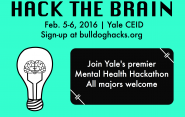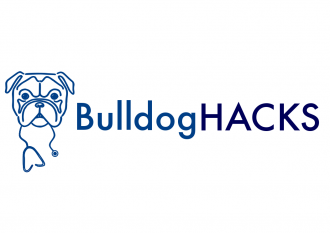Hack the Brain: Yale's First Mental Health Hackathon

How can mental health professionals raise awareness about critical issues, increase access to care or improve treatment? These are a few of the problems likely to be addressed this weekend at Yale's first mental health hackathon.
 Organized by the new student group BulldogHacks, "Hack the Brain: Rethinking Our Approach to Mental Health" takes place Friday and Saturday at the Center for Engineering Innovation & Design. About 80 students have registered for the event so far.
Organized by the new student group BulldogHacks, "Hack the Brain: Rethinking Our Approach to Mental Health" takes place Friday and Saturday at the Center for Engineering Innovation & Design. About 80 students have registered for the event so far.
Participants (all must be Yale-affiliated) will be grouped into teams, each of which will identify a problem that needs to be solved in the field of mental health, devise a solution and build a prototype. There's a $600 prize for innovations in the field of mental health, $400 for those specifically addressing treatment of autism, and a $250 prize for the best proposal focusing on underserved populations.
Judges are Deputy Dean of SEAS Dr. Vincent Wilcynski, CEID Assistant Director Dr. Joseph Zinter, Prof. Arielle Baskin-Sommers, Dr. Suzanne Macari, Dr. Kelly K. Powell, and Dr. Thomas H Styron. The event will also include speakers Prof. Kyle Jensen, Prof. Fred Shic, Dr Seth Feurstein, Wellinks founder Ellen Su, and InnovateHealth Director Dr. Martin Klein.
The event is the idea of Claudia See '17, who was inspired after assisting with the Healthcare Hackathon organized last spring by Yale's Center for Biomedical and Interventional Technology (CBIT).
"Once you know what a hackathon is like, it's really addicting and you just want to spread it to other people," See said. So she and five other undergraduate students formed BulldogHacks to organize their own. Originally, the team planned the event to focus on autism, but eventually broadened it to include other areas of the field of mental health, such as anxiety, depression, addiction, and learning disabilities.
As an example of a potential proposal, See said a team might pitch an app aimed at people suffering from depression designed to reduce feelings of isolation by increasing their connections to others. Another possibility, she said, would be a toy that helps children with autism recognize facial expressions. Each team will receive counsel from one of the 10 mentors, all from the field of mental health, participating in the event. The organizers stress that coding skills or prior experience in hackathons are not needed to participate. In fact, they encourage teams to form with a wide variety of backgrounds and skills.
Friday, the participants will present their "pain points" – issues that need to be addressed – form teams, and brainstorm how to address those issues. Saturday's events, which are open to the public, begin in the morning and end in the evening with an award ceremony.
The event is sponsored by the Yale School of Management, the Yale Entrepreneurial Institute, InnovateHealth Yale, and the Yale Undergraduate Organizations Committee.

